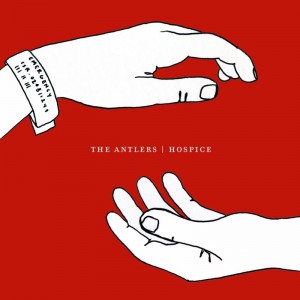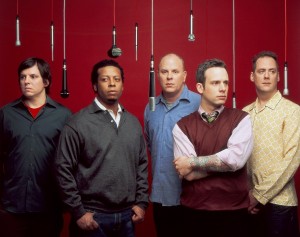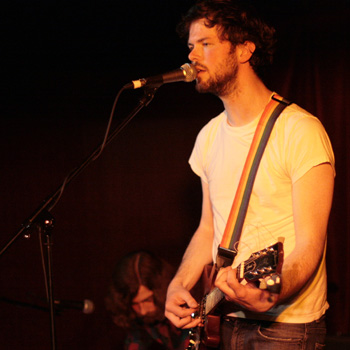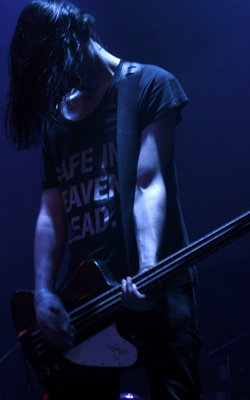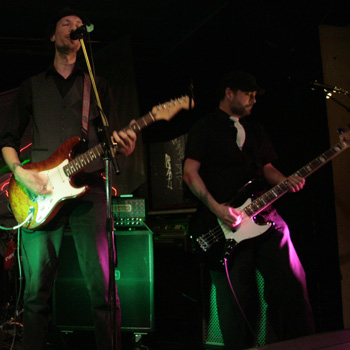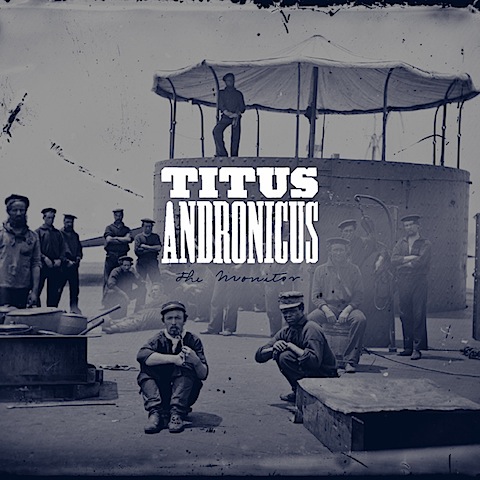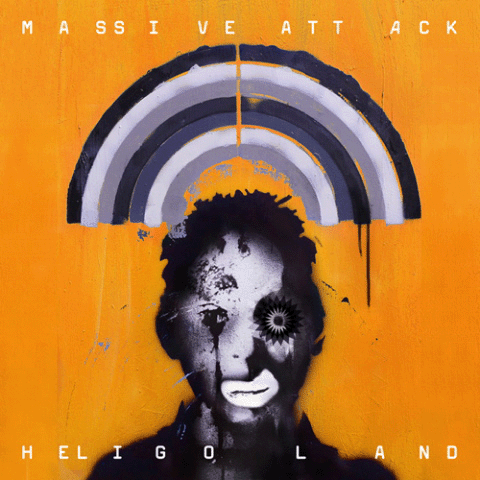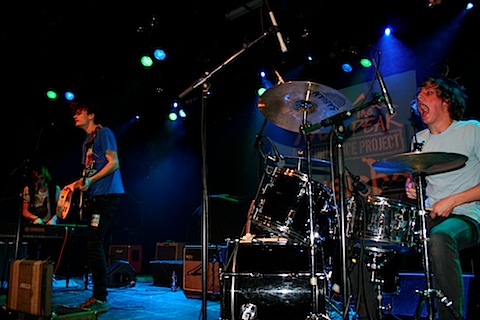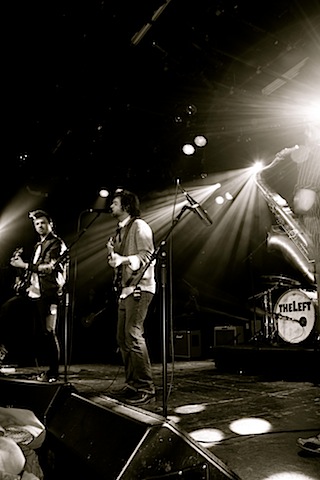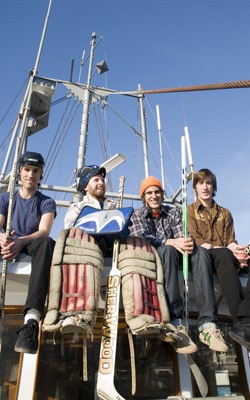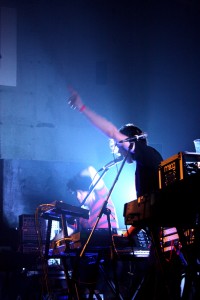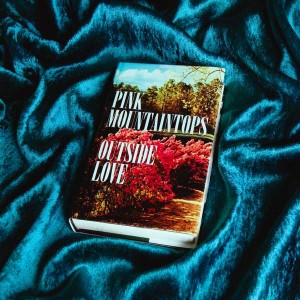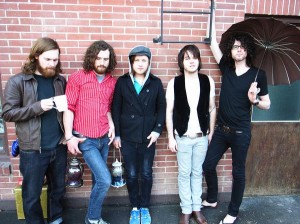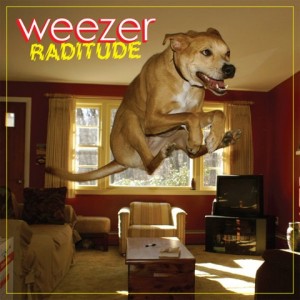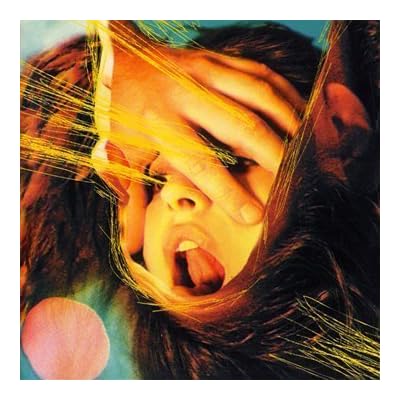The following was originally published in Beatroute Magazine. It is my first time being on the cover of anything, so I’m pretty excited about it. I like how it turned out. Be sure to grab a copy on stands in June if you are in Vancouver.
If Hard Drugs, the band, were a hard drug (a substance), which would it be? Based on the stellar alt-country rock opera by the same name, it would likely be a cocktail – the addictiveness of heroin with a touch of the lower lip-burn associated with some less than optimal ecstasy. It’s a burn that stays with you for a few days, something the album has no problem doing and that listeners will have no problem dealing with, scabs and all. The band bailed on Vancouver and are returning home by circumstance. They’re traveling back by way of concert tour, finishing up with a homecoming show at the Biltmore Cabaret. As a rock band going by the name of Hard Drugs, surely their road trip is peppered with cheap barbiturates and expensive misdemeanors, leaving a trail of empty liquor bottles and chaos across the American southwest, right?
“We’re actually just stopped right now. My wife likes to stop at every thrift store along the way she can find. We just walked in the door”. Jeffry Lee is of course talking about his better half and the current second half of Hard Drugs, Jenni. Currently a husband and wife duo until being reunited with their full band in Vancouver. Having for a long time called East Van home, the band created a rock opera about lovers on the Downtown East Side before relocating temporarily to Brooklyn. “Jenni was transferred by her company, and I followed not long after that”, says Jeffry from a store in New Mexico. It’s an innocuous enough reason to uproot from a place so clearly ingrained in two people. “I knew we wouldn’t be moving to New York forever, or at least that was my mindset. For me it was like an extended holiday. It was hard for me to get by that”.
The two are a couple of many talents, Jenni a fashion designer by trade and Jeffry a graphic designer and illustrator in addition to their musical endeavors. “I moved there with a plan to do more graphics and less music. New York was and is a good place to do that”. It didn’t take long for music to come back to the fore for Lee, as an acquaintance took an interest in the work Hard Drugs had done and pulled him back into the fold. “I ended up still concentrating more on music than I’d planned. I still do both, though”.
You would never guess that the musical aspect of their lives at times took a back seat to other ambitions. A wonderfully cohesive and emotionally raw rock opera was created by the band before their pilgrimage. A valentine to the city they left, the self-titled epic follows the trials and tribulations of Lloyd and Aline, two black tar-crossed lovers trying to make it work surrounded by poverty, drugs and prostitution. From a rousing and hooky introduction to the protagonists, through violence and strife and joy, Jenni and Jeffry take listeners down to the wrong side of Pigeon Park and into the lives of a couple you just can’t help but root for.
“We had a record finished when we left. We didn’t have any real solid interest and nobody was throwing money at us. We didn’t have any big plans, but then we found someone interested in it”. From there it just made sense to play some shows around it, Lee says. It’s a history that quickly repeated itself, with new contacts made in New York offering to produce new material. “I had the opportunity to do this recording with Michael Tudor, a producer that was willing to work with us. I was just like, that would be like the ultimate souvenir of living in New York, making a record while we were there”. The new record remains incomplete, another record left in another city. Having a singular recording experience is on their list of goals. “Hopefully that will happen sooner than later. It would be nice to make a record where it got released in the same city that we were living in, but that probably won’t be until the next, next one”.
The album Hard Drugs tells the story of the two lovers trying their best to leave their circumstances behind, fighting addiction and hopelessness and a pimp named Slim over the course of the LP. It sways between country and folk and even flirts with some crooning piano ballads. It all combines into something that is not only intensely listenable, but something that grows with you over time, it’s emotional intensity amplifying over multiple plays. Stand-out tracks like “Happiness” and “Aline & Lloyd (Reprise)” exhibit a seemingly endless font of talent and vision as to make you furious that it found so many obstacles in the way of it’s dissemination. It spits and stomps and finds more moving moments in the span of a track than most albums find in their entire runtimes. It’s a tour de force through the gutters of dilapidated district.
Influenced heavily by Hedwig and the Angry Inch and created by a pair of fairly multi-faceted people, the narrative was designed to be multimedia compatible, which comes in handy when one finds themselves so close to Broadway. “That was part of the original idea. The thing was, I didn’t really have plans to produce it myself, but I did put it out there”. The shopping of the Hard Drugs story as something that could be put onstage acted as the catalyst for contacts instrumental in the creation of their latest, unreleased work, but as of yet Lee says there have been no Broadway producers biting. “It could still happen someday if someone is interested. I don’t really have the direct interest to take it to that next step.”
The idea of being in a rock band with one’s spouse has the historic precedent to be cringe inducing, but Lee is unfaltering optimistic about their musical interactions. “I think that maybe sometimes I have these expectations of her that you would have of someone in your band, which maybe isn’t something you should probably bring into the marriage. But we make it work and we both have a good time doing it. It’s sort of more my thing and I just love having her a part of it”. Compromise and innovation are the keys to success, he says, adding they “have fashioned this new approach to touring. We’re basically, again, on holiday. There’s no pressure for this tour to be anything but a fun time. It’s working out really well”. At this point Jenni pipes in, jokingly telling Jeffry to “get off the fucking phone”. He laughs, saying “It’s good. It’s probably not great for the band, because we don’t put any pressure on ourselves to succeed. It’s just an excuse for us to be together”.
While Hard Drugs remains the brainchild of Jeffry and Jenni, the record is the product of a veritable all-star Vancouver music roster. Jeffry is former member of Vancouver based alt country act Blood Meridian, of which drummer Joshua Wells and vocalist Matt Camirand would go on to blow up with psychedelic rockers Black Mountain. “Black Mountain blows up, they go on tour and the other three of us were just like ‘well, what should we do?'”. Upon deciding to take up the task of making a rock opera, members of Bend Sinister, Fan Death and Lightning Dust were recruited to help out. “It was just gonna be a side project, so I just asked who I wanted to spend time with. Most of my friends have pretty similar musical taste. I just had a lot of friends who played music. Ninety percent of those people made time and we were able to make a pretty epic record”.
Hard Drugs was fashioned as a story-driven epic in the vein of Hedwig, but something that made more sense and was easier to follow than Ziggy Stardust or Tommy. The idea is one with precedent, but is not without it’s disadvantages. “I wanted to do something that had a bit more of a story to follow”. The effect has been varied. “You’re trying to listen to lyrics in a song and some people catch on more than others just based on how they listen to music. Some people are like, I rarely listen to words so it took me about twenty listens before I found out what was going on in the story”. In a live setting, Lee shies away from playing out of order. “I certainly like to play them all together. It was written as this narrative. It’s fun to play it with a full band. There’s a couple songs we have had to play with the instrumentation. I don’t have a nine piece band so we have to work with whoever is available”.
While the album deals with current political and social issues, Lee does not consider it a political album. “I don’t think I’m offering any solution, but I think it’s a lot about raising awareness”. Lee notes the lack of knowledge of the situation in East Van outside of the city, and bemoans some of the opportunistic coverage of the area during the 2010 Winter Olympics. “It was certainly just negative. What I read was not focusing on the good done by volunteers and organizations on the Downtown East Side. Just on how run down it is and how much of a drug problem there is. Basically for me all I wanted to do was say, yes, anyone who has been there knows that there is something going on down there, but there is two sides. There is some light in the darkness”.
On second thought, maybe some arcane cocktail of entirely illeagal substances doesn’t peg Hard Drugs for what it is. More appropriate is love. Love surrounds and seeps out of the band and has found itself pressed squarely into each track they’ve made. The album is a chronicle of tragic love and romance, and the struggle of Lloyd and Aline only serves to endear them to us, to addict us to them. Jenni and Jeffry even state matter of fact that “love’s the hardest drug of all”. If that’s the case, how does Hard Drugs make it look so easy?
Comments Off on Feature – Hard Drugs
